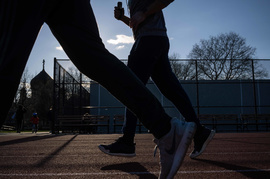After a killing, "Running While Black" stirs even more anxiety.
The killing in February of Ahmaud Arbery, an African-American man in Georgia, and the graphic video of it that emerged this week have brought to the fore a unique anxiety that has long troubled countless runners — running while black.
For many black runners, the killing and its aftermath have shed light on simmering fears of being attacked or racially profiled while running, an anxiety largely undiscussed in the wider running community, but one that is now causing runners of color to think even harder about the decisions they have to make when they go out for a jog.
Gavin Smith, a Boston runner, says if he worries about attacks, “How much freedom do I really have?”
The killing brought to life what Tianna Bartoletta said she faces during a split second of pause — “Is it worth it?” — when she steps outside to go running. The three-time Olympic gold medalist, a black woman, said the activity that has brought her immense joy and professional success is paired with fear.
“I’ve run through streets in Morocco, Italy, Barcelona, Netherlands, China and Japan,” she said over the phone on Friday, “and it’s only in my home country that I wonder if I’ll make it back home.”
Arbery was killed not far from where he lived in Satilla Shores, Ga., a quiet middle-class enclave 80 miles south of Savannah. His family said he was out exercising when two men — who later said they believed he resembled someone wanted for a series of burglaries — followed him in their truck while armed with a shotgun and a handgun, then confronted Arbery and shot him to death.
The killing, which at the time received little national attention, gathered public awareness after cellphone footage showing the confrontation was released this week.
Isaiah Douglas, 58, a longtime runner and operator of heavy machinery who lives in Savannah, said that since the killing he has run largely in a local park rather than on streets to avoid confusing anyone about what he is doing.
He said that in his 35 years as a long-distance runner he had been harassed multiple times, including once during a dawn run when a jeep filled with four white men pulled in front of him and called him by a racist term. As the jeep lingered in front of him, he turned a corner and hoped it did not follow.
“When I am by myself, I tend not to run in certain neighborhoods, where there is a certain feeling I get,” Douglas said.
For many black runners, Aubery's killing made their fear take on a new urgency.



Enjoy being online again!
Welcome to the community of good people who base their values on evidence and appreciate civil discourse - the social network you will enjoy.Create your free account
5 comments
Feel free to reply to any comment by clicking the "Reply" button.Enjoy being online again!
Welcome to the community of good people who base their values on evidence and appreciate civil discourse - the social network you will enjoy.Create your free account
Share this post
Categories
Agnostic does not evaluate or guarantee the accuracy of any content. Read full disclaimer.







